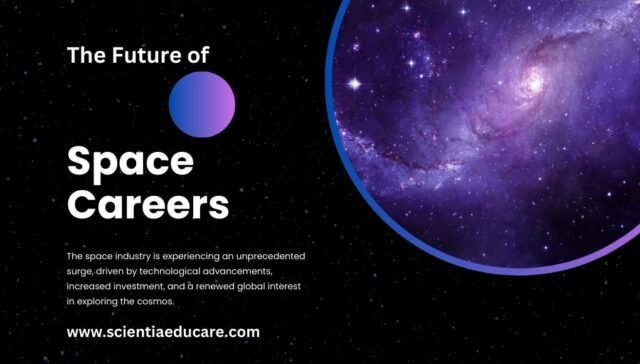The space industry is experiencing an unprecedented surge, driven by technological advancements, increased investment, and a renewed global interest in exploring the cosmos. This growth has led to a plethora of career opportunities across various disciplines. For individuals passionate about space exploration, the horizon is expanding with numerous paths to contribute to humanity’s journey beyond Earth.
The Future of Space Careers,
Careers in space exploration,
Jobs in commercial space industry,
Aerospace engineering opportunities,
Future space industry careers,
Space tourism job prospects
Table of Contents
- Introduction
- The Expanding Landscape of Space Careers
- Key Job Prospects in Space Exploration
- Leading Educational Institutions Offering Space-Related Programs
- Further Reading and Resources
1. Introduction
Space exploration has transitioned from the exclusive domain of governmental agencies to a dynamic sector encompassing private enterprises, international collaborations, and multidisciplinary research. This evolution has broadened the spectrum of careers available, inviting professionals from diverse fields to participate in space-related endeavors.
2. The Expanding Landscape of Space Careers
The global space sector is witnessing significant growth. In the United States, NASA’s activities have sustained approximately 339,645 jobs nationwide, reflecting the agency’s extensive economic impact.
Similarly, the United Kingdom’s space industry comprises 1,765 organizations, employs around 52,000 individuals, and contributes approximately £7.2 billion to the British economy.
This expansion is not limited to traditional roles; emerging fields such as space tourism, satellite technology, and space law are creating new career paths. Companies like Blue Origin and Virgin Galactic are actively recruiting professionals for roles in spaceport operations, spacecraft development, and spaceflight training.
3. Key Job Prospects in Space Exploration
The space industry offers a wide array of career opportunities across various disciplines:
-
Aerospace Engineer: Designs and tests aircraft, spacecraft, and related systems and equipment.
-
Astrophysicist: Studies the physical properties of celestial objects and phenomena.
-
Satellite Systems Engineer: Focuses on the design, development, and maintenance of satellite systems.
-
Space Robotics Engineer: Develops robotic systems for use in space exploration and operations.
-
Space Policy Analyst: Researches and analyzes policies affecting space exploration and utilization.
-
Space Medicine Specialist: Focuses on the health of astronauts, studying the effects of space travel on the human body.
-
Planetary Geologist: Studies the geology of planets, moons, and other celestial bodies.
-
Spacecraft Operations Manager: Oversees the daily operations of spacecraft, ensuring mission objectives are met.
-
Space Lawyer: Specializes in the legal aspects of space activities, including treaties, regulations, and commercial agreements.
-
Space Educator: Develops educational programs to inspire and inform the public and students about space science and exploration.
These roles are available across various organizations, including governmental space agencies, private aerospace companies, research institutions, and international organizations.
4. Leading Educational Institutions Offering Space-Related Programs
Pursuing a career in space exploration often begins with specialized education. Here are some top universities and institutions around the world offering programs in space science and technology:
-
Massachusetts Institute of Technology (MIT), USA: Offers programs in Aeronautics and Astronautics, providing a strong foundation in aerospace engineering.
-
California Institute of Technology (Caltech), USA: Home to the Jet Propulsion Laboratory, Caltech offers programs in Space Engineering and Planetary Science.
-
International Space University (ISU), France: Provides interdisciplinary graduate programs focusing on all aspects of space exploration.
-
Luleå University of Technology, Sweden: Offers the Joint European Master in Space Science and Technology, focusing on space science and technology.
-
University of Tokyo, Japan: Provides programs in Aerospace Engineering with opportunities for research in space technology.
-
University of Toronto, Canada: Offers Aerospace Engineering programs with a focus on space systems and robotics.
-
Technical University of Munich (TUM), Germany: Provides courses in Space Exploration and related fields.
-
Embry-Riddle Aeronautical University, USA: Offers space-related degree programs, including Astronomy and Astrophysics, Space Physics, and Spaceflight Operations.
-
University of Colorado Boulder, USA: Provides programs in Aerospace Engineering Sciences with a focus on space exploration.
-
Cranfield University, UK: Offers postgraduate programs in Astronautics and Space Engineering.
These institutions provide a range of undergraduate and graduate programs tailored to various aspects of space science, engineering, and policy.
5. Further Reading and Resources
For those interested in exploring more about careers in space exploration, the following resources offer valuable insights:
-
SpaceCareers.uk: A platform providing information on space-related job opportunities and career advice.
-
The Space Report: Offers insights into emerging space jobs and industry trends.
-
Europlanet Society: Provides information on careers in planetary exploration.
-
NASA’s Economic Impact Report: Details the agency’s contributions to job creation and economic growth.
-
Coursera: Offers online courses related to space exploration from various universities.
The rise of space exploration careers presents an exciting frontier for professionals across disciplines. With the right education and a passion















Your point of view caught my eye and was very interesting. Thanks. I have a question for you.